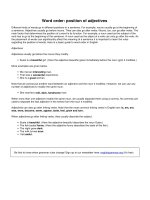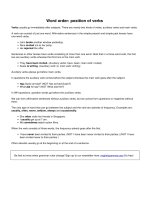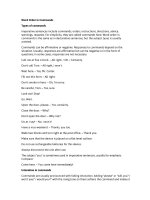word order
Bạn đang xem bản rút gọn của tài liệu. Xem và tải ngay bản đầy đủ của tài liệu tại đây (2.08 MB, 22 trang )
Word Order in Complex Sentences
There are five parts of a sentence: the subject, the predicate, the attribute,
the object, and the adverbial modifier. Accordingly, there are five types of
subordinate clauses: the subject clause, the predicative clause, the
attributive clause, the object clause, and several types of adverbial clauses.
Subordinate clauses are also called dependent clauses because they can't be
used without the main clause. Word order in subordinate clauses is first the
subject, then the verb. Compare these pairs of simple and complex
sentences:
I bought a book on history.
I bought the book that you asked for.
I know the way to his house.
I know where he lives.
He went home after work.
He went home after he had finished work.
The subject clause
The subject clause functions as the subject of the sentence. Subject clauses
are introduced by the words "who, what, how, when, where, that, whether".
Who brought the roses is a secret.
What you told me was interesting.
How it happened is not clear.
The subject clause is often placed after the predicate, and the formal subject
"It" is used in such sentences.
It is not known who brought the roses.
It is not clear how it happened.
It is doubtful that he will come back today.
The predicative clause
The predicative clause functions as part of the predicate and usually stands
after the linking verb BE.
The problem is that he is rude.
The question is where I can find enough money for my project.
This is what he said to her.
This is how it happened.
The attributive clause
The attributive clause performs the function of an attribute and stands after
the noun that it modifies. Attributive clauses are introduced by the words
"who, whom, whose, which, that, when, where, why".
The man who helped her was Dr. Lee.
The bag that he bought cost forty dollars.
Here's the book that I am talking about.
The place where she lives is not far from here.
The time when they were friends is gone.
The object clause
Object clauses function as objects. (Object clauses are described more fully
in Sequence of Tenses in the section Grammar.)
He told us that he had already bought a car.
I know where we can find him.
I asked how I could help him.
Types of adverbial clauses
Adverbial clauses function as adverbial modifiers. Adverbial clauses include
several types of clauses that indicate time, place, purpose, cause, result,
condition, concession, manner, comparison.
The adverbial clause of place
He went where I told him to go.
This cat sleeps wherever it wants.
Go down this street and stop where the road turns right.
The adverbial clause of time
When she arrived, they went home.
She left while he was sleeping.
He hasn't called me since he arrived.
He left before I returned.
Call me as soon as you receive the report.
No future tense is used in subordinate clauses of time referring to the future
(after the conjunctions "when, till, until, after, before, as soon as, as long
as, by the time", and some others). The present tense, usually the Simple
Present, is used instead of the future in clauses of time.
He will call you when he returns.
I'll help you after I have dinner.
I will wait until he finishes his work.
I said that I would wait until he finished his work.
The adverbial clause of condition
We will go to the lake on Saturday if the weather is good.
If the plane left on time, they should be in New York now.
If he has already seen the report, he knows about our plans.
No future tense is used in subordinate clauses of condition referring to the
future (after the conjunctions "if, unless, in case, on condition that", and
some others).
If he calls, tell him the truth.
I will talk to him if I see him.
I won't be able to go with you unless I finish this work soon enough.
The adverbial clause of purpose
He works hard so that he can buy a house for his family.
He gave her detailed directions so that she could find his house easily.
They should call her in advance so that she may prepare for their visit.
We left early in order that we might get there before the beginning of the
wedding ceremony.
The adverbial clause of result
My car was repaired on Thursday so that on Friday I was able to leave.
I have so much work this week that I won't be able to go to the concert.
It was so cold that I stayed home.
He was so tired that he fell asleep.
The adverbial clause of reason
I can't come to the party because I have a cold.
I went home because I was tired.
I called you because I needed money.
Since she didn't know anyone there, she stayed in her room most of the
time.
As there are several possible answers to this question, let's discuss all of
them.
The adverbial clause of comparison
He works as quickly as he can.
Tom is older than I am.
It looks as if it is going to snow.
You sound as if you have a sore throat.
Note that after "as if; as though", the subjunctive mood is used in cases
expressing unreality.
He looks as if he were old and sick.
She described it as if she had seen it all with her own eyes.
She loves them as though they were her children.
(See more examples with "as if, as though" at the end ofSubjunctive Mood
Summary in the section Grammar.)
The adverbial clause of concession
Though he was tired, he kept working.
Although it was already dark, he could still see the shapes of the trees.
He didn't convince them, although he tried very hard.
No matter what she says, call me at nine o'clock.
Whatever happens, you must help each other.
Find him, whatever happens.
Note: Commas
A comma is generally not used between the main clause and the adverbial
subordinate clause if the subordinate clause stands after the main clause.
But a comma is used between them if the subordinate clause stands at the
beginning of the sentence before the main clause. Compare:
She went for a walk in the park after she had finished her work on the report.
After she had finished her work on the report, she went for a walk in the
park.
A comma is used before the adverbial subordinate clause if the subordinate
clause refers to the whole main clause (not only to the verb in it). Such
situations often occur in the case of the clauses beginning with "though,
although, whatever, no matter what" and "because". Compare:
She was absent because she was ill.
They must have been sleeping, because there was no light in their windows.
Types of subordinate clauses in English sources
There are some differences in the way English and Russian linguistic sources
describe subordinate clauses, which may present some difficulty for language
learners.
In English grammar materials, subordinate clauses are divided into three
main types: noun clauses, adjective clauses, and adverb clauses. Adjective
clauses (attributive clauses) and adverb clauses (adverbial clauses) are
described similarly in English and Russian materials.
Noun clauses are described differently in English materials. Noun clauses
include three types of subordinate clauses described in Russian materials:
the subject clause, the predicative clause, and the object clause.
Noun clauses
Noun clauses function as nouns. A noun clause can serve as the subject of
the sentence, as a predicative noun, or as an object.
What he said was really funny. (Noun clause "What he said" is the subject.)
This is not what I meant. (Noun clause "what I meant" is in the function of
predicative noun.)
She says that he will come back tomorrow. (Noun clause "that he will come
back tomorrow" is a direct object.)
He is not interested in what she is doing. (Noun clause "what she is doing"
is a prepositional object.)
Relative clauses
The term "relative clauses" in English materials refers to noun clauses and
adjective clauses introduced by the relative pronouns "who (whom, whose),
which, that, what".
Relative clauses in the form of noun clauses are introduced by the relative
pronouns "who (whom, whose), which, what".
Who will be able to do it is still a question.
I don't know which of these bags belongs to her.
I didn't hear what he said.
Relative clauses in the form of adjective clauses are introduced by the
relative pronouns "who (whom, whose), which, that". "Who" refers to
persons; "which" refers to things"; "that" refers to things or persons. To
avoid possible mistakes, language learners should use "who" (not "that")
when referring to people.
The boy who is standing by the door is her nephew. Or: The boy standing by
the door is her nephew.
The man to whom she is speaking is her doctor. Or: The man she is speaking
to is her doctor.
The house in which he lived was too far from the center of the city. Or: The
house he lived in was too far from the city center.
The people whose house he bought moved to Boston.
I lost the pen that you gave me. Or: I lost the pen which you gave me. Or:
I lost the pen you gave me.
She likes the stories that he writes. Or: She likes the stories which he writes.
Or: She likes the stories he writes.
Relative clauses that have parenthetical character (i.e., nonrestrictive
clauses) are separated by commas. Such clauses are usually introduced by
the relative pronouns "which" and "who" (whom, whose), but not by "that".
She lost his book, which made him angry.
She doesn't study hard, which worries her parents.
My brother, who now lives in Greece, invited us to spend next summer at his
place.
The war, which lasted nearly ten years, brought devastation and suffering to
both countries.









